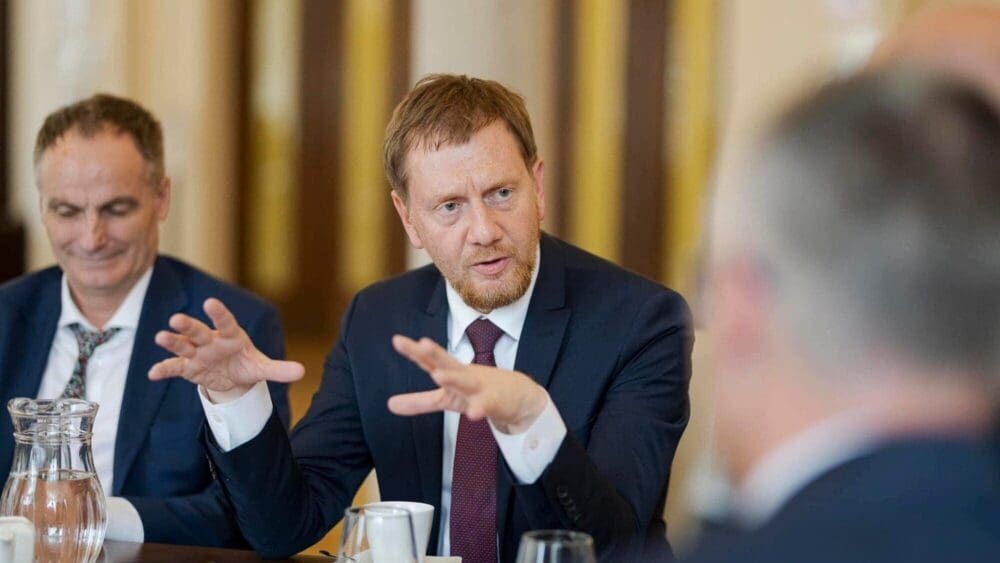
Prime Minister of Saxony Michael Kretschmer
Facebook, June 26th
A growing number of mainstream politicians have begun to join national conservative parties across Europe in their call to reverse the EU’s failing Ukraine strategy.
The latest to call for pivoting to a pro-ceasefire approach instead of continuing to send endless weapons shipments that Europe can’t afford was Michael Kretschmer, the minister president of the German federal state of Saxony, in a recent interview with the RedaktionsNetzwerk Deutschland (RND), published on Friday, August 9th.
“We can no longer provide funds for arms to Ukraine, only for these weapons to be used up and not to achieve anything. Everything has to be proportionate,” the center-right (CDU) politician told the paper—incidentally owned by the ruling social democrat SPD. “Support, yes, but we are realizing that we [Germany] are reaching our limits,” he added.
The PM discussed Germany’s current economic challenges amid the ongoing budget crisis in Berlin—including how ‘unsustainable’ it is that Germany is spending “tens of billions” on both migration and the war. The interviewer asked whether he was in favor of limiting or ending military support to Ukraine in order to save money.
“From the beginning, I have clearly spoken out against arms deliveries and advocated diplomatic initiatives,” Kretschmer said. “I have had a very clear opinion on this for two years and I must unfortunately say that this has been confirmed in many points,” he said, reiterating his position that the war in Ukraine would not end on the battlefield, but at the negotiating table.
Although this may seem a surprising take coming from a top CDU politician, it has been the most popular position among Europeans in most EU countries for at least half a year, according to two separate surveys by the European Council on Foreign Relations (ECFR), the primary pro-establishment foreign policy think-tank in Brussels. But while a plurality of European voters expect the EU to “push” Ukraine towards the negotiating table, the Brussels elite remains deaf to these calls.
Poll: #Europe and #Ukraine Disagree on How the War Should End
— The European Conservative (@EuroConOfficial) July 3, 2024
Europeans don't share the Ukrainians' firm belief in their #victory and would like to see #Kyiv negotiate a #ceasefire settlement with #Moscow—in line with the Hungarian EU presidency’s goals.https://t.co/8Gdq8j5fcw
Of course, there is a more pressing political dimension to the prime minister’s comments. Saxony will hold regional parliamentary elections on September 1st, and the only major opponents the CDU will face are the populist parties from the Right and Left: the Alternative für Deutschland (AfD) and Sahra Wagenknecht’s BSW, both of which are against arms deliveries and want tougher response to illegal migration.
The CDU has reasons for concern, as the AfD won in every East German state during the EU elections in June. In Saxony, the national conservatives beat the CDU with ten points, claiming 31.8% against the center-right’s 21.8%, while BSW came in third with 12.6%.
Since then, this ratio began to slowly reverse, as the latest poll conducted August 5th-8th put the CDU back on top for the first time since June with 34%, compared to the AfD’s 30% and BSW’s 11%. Meanwhile, the parties in the federal government, the Socialists and Greens, are barely hitting the 5% threshold required to enter the Saxon parliament.
Nonetheless, Kretschmer’s comments must not be portrayed solely as a cynical, last-minute effort to harness more votes ahead of this knife’s edge election. The job of politicians in representative democracies is to represent the people’s views, a concept that Brussels is seemingly unable to grasp.
